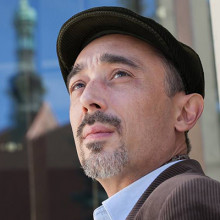Polish literature

Marcin Wroński
Marcin Wroński (born 1972) is a prose-writer, journalist and editor. He’s a graduate of the Polish Studies Department of the Catholic University of Lublin, and lives in Lublin.
His literary debut was a collection of short stories titled Mrs. Night’s Thigh [Udo Pani Nocy] published in 1992 (in the mid-1980s his science-fiction stories were published – with a print run of only three copies). In the 1990s, he wrote texts for art zines, songs and skits for the “Osoby o Nieustalonej Tożsamości” cabaret, and opinion pieces for TOP radio. He was also a high school teacher and editor of children’s books.
Wroński gained popularity with his series of retro detective novels published from 2007 onwards, featuring the pre-war police commissioner Zyga Maciejewski as the main character. In the first book of the series, Murder Under Censorship [Morderstwo pod cenzurą], the commissioner is described as follows: ‘As powerful as a litre of vodka drunk with three “medusas” in the dive called “Elegant” in Lublin. As effective as a boxer’s straight right, as captivating as Rudolf Valentino and as unrestrained as a charging tank. That’s Officer Zygmunt “Zyga” Maciejewski and his people’. Maciejewski is sometimes disagreeable, he’s an alcoholic and a slob, but he puts the good of his loved ones and the success of his investigations above all else. He’s a character that’s impossible to feel indifferent towards. “Zyga” is not, however, the only protagonist of Marcin Wronski’s detective novels: the other protagonist is the city of Lublin in the 1930s and 40s. The writer precisely describes the space in which the novel’s protagonists function. He makes use of anecdotes and characters from the city’s history to capture the atmosphere of a place that has experienced great trials and tribulations throughout history, to show the political, social and religious problems which plague it.
Wroński has expressed his passion for Lublin many times: in writing educational articles about the pre-war and wartime history of the city for the “Pamięć Miejsca” website in 2009 and writing the political-ecclesiastical thriller Officium Secretum: The Lord’s Dog [Officium Secretum. Pies Pański] (2010), the action of which takes place in contemporary Lublin. However, it’s interwar history which attracts him the most. The authorities of Lublin have appreciated Wroński’s contribution to the city’s image, awarding him with many prizes. Furthermore, nearly all of Wroński’s crime novels have been nominated for the Great Calibre Award, which is awarded to the best Polish crime novel or thriller each year. The book Pogrom Next Tuesday [Pogrom w przyszły wtorek] received this award, and The Winged Coffin [Skrzydlata trumna] and Pogrom Next Tuesday received the High Calibre Readers’ Award. The novel Venus Cinema [Kino “Venus”] was nominated for a Polityka Passport Award.
I was born in 1972, which is not particularly important. What is more important is that I was born in Lublin. For a long time, I could sense the toxicity of my relationship with this city, until I understood that it was, quite simply, tough love.
– Marcin Wroński.
BIBLIOGRAPHY
- Udo Pani Nocy i inne opowiadania, Lublin 1992.
- Obsesyjny motyw babiego lata, Lublin: PoliART Studio, 1994.
- Tfu, pluje Chlu! czyli Opowieści z Pobrzeża, Lublin: Fabryka Słów, 2005.
- Wąż Marlo, t. 1, Lublin: Fabryka Słów, 2006.
- Komisarz Maciejewski. Morderstwo pod cenzurą, Lublin: Red Horse, 2007 (wydanie II – Warszawa: W.A.B., 2010; wydanie III – Warszawa: W.A.B., 2011, w serii Lato z kryminałem).
- Komisarz Maciejewski. Kino „Venus”, Lublin: Red Horse, 2008 (wydanie II – Warszawa: W.A.B., 2011; wydanie III – Warszawa: W.A.B., 2012, w serii Lato z kryminałem; wydanie IV – Warszawa: W.A.B., 2012).
- Officium Secretum. Pies Pański, Warszawa: W.A.B., 2010.
- A na imię jej będzie Aniela, Warszawa: W.A.B., 2011.
- Skrzydlata trumna, Warszawa: W.A.B., 2012.
- Pogrom w przyszły wtorek, Warszawa: W.A.B., 2013.
- Haiti, Warszawa: W.A.B., 2014.
- Kwestja krwi, Warszawa: W.A.B., 2014.
TRANSLATIONS
Russian:
- Morderstwo pod cenzurą – Нецензурное убийство, trans. Jelena Barzowa, Gajane Muradian, Gesharim/Mosty Kultury Moskwa 2012.
- Kino „Venus” – Кинотеатр «Венера», trans. Natalia Wiertiaczyk, Gesharim/Mosty Kultury, Moskwa 2012.